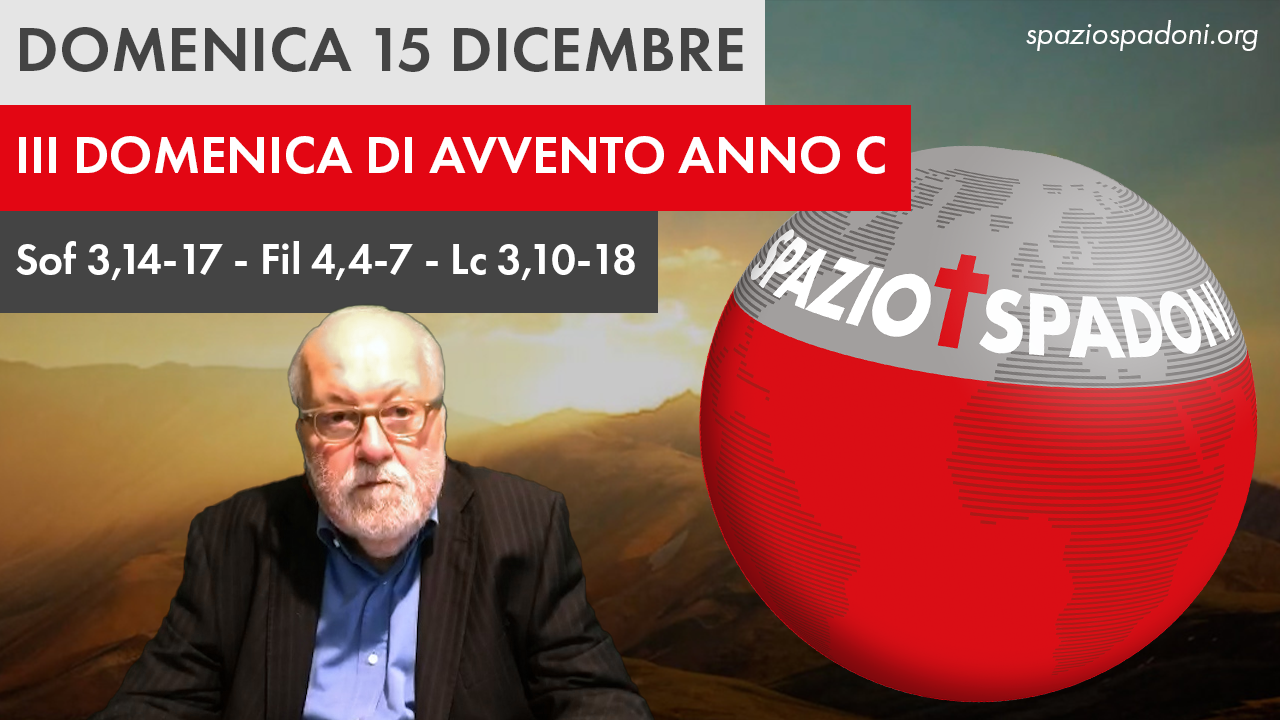
III Sunday Of Advent Year C
Readings: Zeph 3:14-17; Phil 4:4-7; Lk 3:10-18
Luke, in accordance with the other synoptics, and John, opens the Gospel proper with the preaching of the Baptist (3:1-20), but unlike the other evangelists he premises a broad outline of the politico-religious situation in which the forerunner begins his manifestation, from the emperor of Rome to the pontificate of Annas and Caiaphas. The “fifteenth year of the empire of Tiberius Caesar” oscillates between the 26th and 28th of the Christian era.
Luke abounds in his enumeration by recalling alongside Galilee and Judea the pagan dominions, precisely to remind us that not only Israel but also the Gentiles were called to come under the kingship of Christ.
Luke in the infancy “narrative” (1:5-80) had left John “in the wilderness”; from here he now resumes to speak of his mission, only unlike Matthew and Mark the forerunner is not stationary in one place but moves “throughout the whole region of the Jordan” (3:3), rather populated at the time because of the building activity of Herod the Great and Archelaus: he is not so much a hermit retreating to the wilderness as an itinerant prophet.
John’s mission is that of all prophets: to bring the people back to their God. Conversion is the usual theme of prophetic preaching. In fact, one is never fully oriented toward the good, toward God and neighbor; there is always something or much to be changed, rectified, perfected. John’s cry “Prepare the way of the Lord, straighten his paths” never resounds in vain for those who listen to the Word of God, which is always a sharp, double-edged sword that has much to sever, uproot in the hearts of men, especially the believer (cf. Is 49:2; Heb 4:12).
John accompanies his preaching with an invitation to undergo a symbolic rite that in itself did not accomplish but indicated the change of life that the penitent set out to bring about.
“Baptism” consisted of immersion and re-emergence in and from the waters of the Jordan. By such a gesture the man signaled to those present that a spiritual ablution was taking place in his innermost being, a reneging of his old habits with the intention of bringing in a new regime of life, made up of humility, goodness, meekness, and loyalty.
The words spoken or placed in John’s mouth come from Is 40:2-5 and are those with which the great postexilic prophet announces to his countrymen the end of Babylonian slavery and the return to his homeland. It is therefore an announcement of consolation and not an oracle of doom. John will also take on the persona of a sullen and catastrophic preacher (Lk 3:7-18), but in these early stretches of his mission he is a herald of joyful news, in other words of the “Gospel.”
We are on the Sunday “laetare,” of Joy: Zephaniah in the first reading (Zeph 3:14-27), bursts forth for us in a magnificent cry, “Rejoice, exult, rejoice, for the Lord is in your midst, and he takes away all anxiety; he is a mighty Savior. And indeed he loves you so much that it is he who rejoices over you, even though you are frail, unworthy, sinners!” And Paul repeats this in the second reading, “Rejoice in the Lord. I tell you again: rejoice…! The Lord is near! Do not distress yourselves over anything!” (Phil. 4:4-7).
This is the characteristic of the Christian: Joy, even in difficulties and tribulations, but one must educate oneself about Joy: one must welcome it, make room for it in one’s heart. The “road” to be prepared is no longer the one that crosses the desert, from Babylon to Jerusalem, but rather the shorter, yet more treacherous one that goes from the mind to the heart, to the will of man, and where all kinds of anxieties and worries lurk that hinder and prevent its viability.
Finally, three different categories parade before the Baptist. These pericopes (vv. 10-14) that are exclusive to Luke reveal the evangelist’s interest in the universal dimension of redemption. It is an essay in “professional morality.”
- The Jews who vainly allege their descent from Abraham and who must, instead, perform “fruit worthy of conversion,” that is, bearing witness to a genuine change of life.
- The publicans, that is, the tax collectors and their subordinates, invited to the rigor of justice by avoiding bribery and harassment.
- The soldiers, who are enjoined to overcome all kinds of violence.
“And what are we to do…? It does not matter what you do, but how you do it. You can be a parliamentarian or a housewife, a priest or a farmer, a teacher or a soldier, an accountant or a clerk, it is not the profession that counts, but the quality of your action: with how much justice, commitment, humanity, with how much passion and authenticity you carry out your task. There where you are called to live, in the humble everyday, there you must be a man of justice and communion. That is your prophecy. Then, beginning with you, you resume weaving the good fabric of the world” (E. Ronchi). And to spread the Joy of God.
